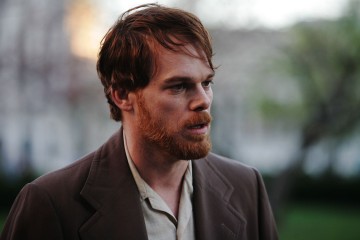Norwegian Wood
La Ballade de l’impossible (ノルウェイã®æ£® / Norwegian Wood) est un film japonais réalisé par Trần Anh Hùng, d’après le roman éponyme de Haruki Murakami, sorti en 2011 en France, et dont Jonny Greenwood a réalisé quelques titres sur la B.O.
[quote cite=”Jonny Greenwood / Nialler9 ‘An interview with Jonny Greenwood’, 21 juillet 2011″]You have reworked some previous material for Popcorn Superhet Receiver into There Will Be Blood and Doghouse into Norwegian Wood. What was the reasoning for this?
Jonny: The directors of those films just had enthusiasm for them, so we worked elements from each into the soundtracks.[/quote]
[quote cite=”Jonny Greenwood / Knack, 4 mai 2011″]How did you end up doing Norwegian Wood?
JG: Tran Anh Hung asked me if I wanted to write the score and I replied “No, I don’t have the time – I’m working on the new Radiohead album.” After that I began working on some ideas anyway, without having seen the film or read the script, merely out of interest. Then Hung asked me again – he wouldn’t budge and his enthusiasm was infectious. He turned out to be a fan of ‘There Will Be Blood’. Apparently he was looking for a similar blend of loveliness and menace, light and darkness.
Did you know Hungs earlier work?
No, although he used ‘Creep’ in his second film ‘Cyclo’. I watched his debut ‘The Scent of the Green Papaya’ on dvd recently – both of the films are beautiful. I’d read Murakami’s novel, which was my only source of inspiration from the outset. None of my first melodies have made the final film, though.
How did you start your work on the soundtrack?
There are scenes in the book in which Reiko, one of the main characters, teaches guitar lessons. I wondered which music she’d play and that’s what brought up the first ideas. The images are secondary – I prefer basing my work on discussions with the filmmaker. Luckily Hung had many strange and specific suggestions. He thought it was important that the music evoked confusing emotions because the characters aren’t mature just yet. At other times he showed me some close-ups and said ‘Now write music that fits this facial expression’. Most directors give instructions such as ‘A fast piece here, some menace there, then an emotional climax.’ It’s always a thankful job to be able to take off from a concrete image or idea. Paul Thomas Anderson also worked that way. Both directors don’t cover everything in sound, they give their films room to breathe.[/quote]
Synopsis : Tokyo, fin des années 1960. Kizuki, le meilleur ami de Watanabe, s’est suicidé. Watanabe quitte alors Kobe et s’installe à Tokyo pour commencer ses études universitaires. Alors qu’un peu partout, les étudiants se révoltent contre les institutions, la vie de Watanabe est, elle aussi, bouleversée quand il retrouve Naoko, ancienne petite amie de Kizuki. Fragile et repliée sur elle-même, Naoko n’a pas encore surmonté la mort de Kizuki. Watanabe et Naoko passent les dimanches ensemble et le soir de l’anniversaire des 20 ans de Naoko, ils font l’amour. Mais le lendemain, elle disparaît sans laisser de traces. Watanabe semble alors mettre sa vie en suspension depuis la perte inexplicable de ce premier amour. Lorsqu’enfin il reçoit une lettre de Naoko, il vient à peine de rencontrer Midori, belle, drôle et vive qui ne demande qu’à lui offrir son amour.




No Comment